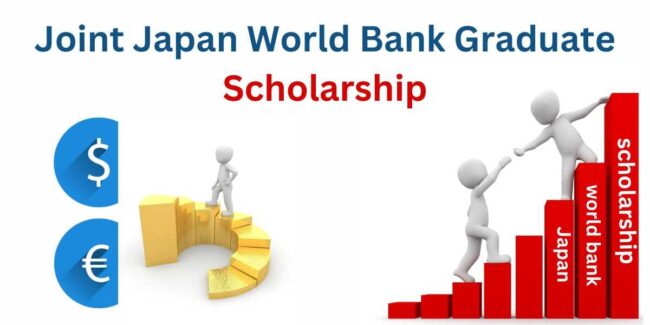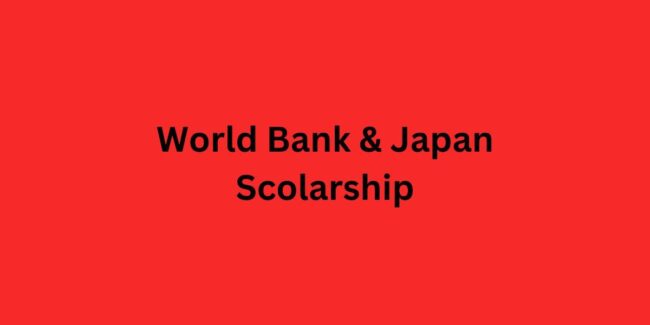This World Bank Scholarship is for students searching for a post-graduate degree from world-famous universities. The scholarship achiever will get op
This World Bank Scholarship is for students searching for a post-graduate degree from world-famous universities. The scholarship achiever will get opportunities to study at about 19 universities like renowned Harvard, Tokyo and Oxford. Students from developing countries all over the world listed by the World Bank will be able to apply for this scholarship. The World Bank and Japan offer these ‘postgraduate scholarships’ to study at various universities worldwide. Students will get this scholarship under the ‘Joint Japan World Bank Graduate Scholarship’.
Table of Contents
Qualifications to Apply
- An applicant must be a citizen of a developing country member enlisted to the World Bank;
- Dual citizenship need not apply;
- Applicant must be in good health. Must have completed;
- Graduation degree at least three years prior to the date of application;
- An applicant should be involved in development-related work for 3 years or more.
Application Window/Time Period of World Bank Scholarship
- Application Window 1
Starting Date: 15 January 2024
Ending Date: 29 February 2024
Selected applicants List published date: End of March 2024 - Application Window 2
Starting Date of Apply: 25 March 2024
Ending Date of Apply: 24 May 2024
Selected applicants List published date: End of June 2024
Read More From
Computer History: Update Timeline
Application Guideline for Scholarship Program (JJ/WB GSP)
The Joint Japan/World Bank Graduate Scholarship application guideline has been included here as a PDF. Download your copy of the scholarship application guidelines.
Scholarship Facilities of World Bank Scholarship
- Full tuition fees
- Medical insurance
- Air travel expenses
- Monthly stipend for accommodation, food and books.
More to read
50 English Grammar MCQ Questions for the Test

This scholarship will not cover:
- * Visa application fee
- * Scholar’s family members to support;
- * Any extracurricular activities fee;
- * Minimum credits to achieve the graduate degree;
- * Any language training under the graduate program;
- * Any additional travel during the study program;
- * Any expenses engaged with research, materials, trips, participation in seminars, or internships.
- * Any computer or devices as the material belongs to the study
- * Any fee for a residential permit.
To learn more about the accuracy of the scholarship, you can visit Japan World Bank Graduate Scholarship Program.
Name of the Universities for Study With Scholarship
- Harvard University — Kennedy School of Government
- Australian National University
- Brandeis University
- Columbia University, School of International and Public Affairs
- Erasmus University, Rotterdam-IHS
- IHE Delft Institute
- Johns Hopkins University
- KIT-Vrije Universities
- Keio University
- London School of Economics
- National Graduate Institute for Policy Studies (GRIPS)
- Saitama University
- SOAS University of London
- Stanford University
- University of Birmingham
- University of California-Berkeley
- University Clermont-Auvergne — FERDI
For more World Bank Scholarship Universities, click on Universities.
World Bank
The World Bank is called an international financial institution. This bank provides financial and technical assistance to developing countries enlisted in the World Bank. Its primary goal is to reduce poverty and support sustainable economic development. The World Bank Group consists of five institutions, each with a specific purpose:
- International Bank for Reconstruction and Development (IBRD): The IBRD provides loans and financial services to middle-income and creditworthy low-income countries. It focuses on development projects and programs that aim to reduce poverty and promote economic growth.
- International Development Association (IDA): The IDA provides concessional loans (low or zero-interest loans) and grants to the world’s poorest countries. These funds are used for projects and initiatives that may not be financially feasible for these countries without external assistance.
- International Finance Corporation (IFC): The IFC is the private sector arm of the World Bank Group. It provides investment and advisory services to stimulate private sector development in developing countries.
- Multilateral Investment Guarantee Agency (MIGA): MIGA provides political risk insurance and credit enhancement to encourage foreign direct investment in developing countries, thereby promoting economic growth and development.
- International Centre for Settlement of Investment Disputes (ICSID): ICSID provides facilities for the arbitration and conciliation of investment disputes between governments and foreign investors.
The World Bank’s projects cover a wide range of sectors, including education, health, infrastructure, agriculture, and environmental sustainability. It also conducts research and produces reports on global economic trends and development issues. The president of the World Bank is typically nominated by the United States, which is the largest shareholder in the institution. The World Bank Group is headquartered in Washington, D.C.
To know about the list of developing countries or eligible countries enlisted by the World Bank, click on – Developing Countries.
More Opportunities to
Scholarship: Deanship of Graduate Studies in Saudi Arabia

FAQ
What is the Japan World Bank Graduate Scholarship?
The Japan World Bank Graduate Scholarship Program is a scholarship initiative that provides opportunities for individuals from developing countries to pursue postgraduate studies in development-related fields. The program is funded by the Government of Japan and administered by the World Bank.
Key features of the Japan World Bank Graduate Scholarship include:
- Eligibility: The scholarship is typically targeted at applicants from developing countries who are applying to pursue a master’s degree in development-related fields. Eligibility criteria may vary, so it’s essential to check the specific requirements outlined by the program.
- Fields of Study: The scholarship supports studies in a range of development-related fields such as economics, public policy, education, health, environmental studies, engineering, and more.
- Coverage: The scholarship provides financial support for tuition and fees, a monthly living allowance, and travel expenses.
- Commitment to Development: Recipients of the Japan World Bank Graduate Scholarship are expected to return to their home countries upon completion of their studies and apply their acquired skills and knowledge to contribute to the development of their nations.
- Application Process: Interested candidates typically need to apply directly to the participating universities and programs eligible for the scholarship. The application process may include submitting academic records, letters of recommendation, and a statement of purpose.
It’s important to note that details of the program, including eligibility criteria, application procedures, and participating universities, may change over time. Therefore, interested individuals should check the official World Bank website or the specific scholarship program’s webpage for the most up-to-date and accurate information

COMMENTS